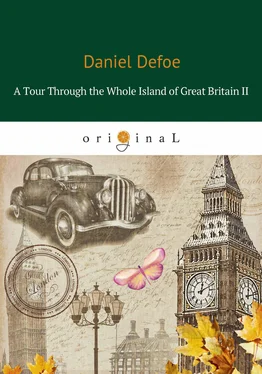But the beauty of Tiverton is the Free-School, at the east entrance into the town, a noble building, but a much nobler foundation; it was erected by one Peter Blundel, a clothier, and a lover of learning, who used the saying of William of Wickham to the king when he founded the royal school at Winchester, viz. That if he was not himself a scholar, he would be the occasion of making more scholars, than any scholar in England; to which end he founded this school: He has endowed it with so liberal a maintenance, that, as I was informed, the school-master has, at least, sixty pounds per annum, besides a very good house to live in, and the advantage of scholars not on the foundation, and the usher in proportion; and to this he added two fellowships, and two scholarships, which he gave the maintenance for to Sydney-College in Cambridge, and one fellowship, and two scholarships, to Baliol-College in Oxford, all which are appointed for the scholars bred up in this school, and the present reverend master, was a scholar upon the foundation in the same school.
As this is a manufacturing country, as above, we found the people, here, all fully employed, and very few, if any, out of work, except such as need not be unemployed, but were so from mere sloth and idleness, of which, some will be found every where.
From this town, there is little belonging to Devonshire, but what has been spoken of, except what lies in the road to Taunton, which we took next, where we meet with the river Columb, a river rising also in the utmost limits of the shire towards Somersetshire, and giving name to so many towns on its banks, as leaves no room to doubt of its own name being right, such as Columb David’s, Ufcolumbe, Columstock, and Columbton; the last is a market town, and they are all full of manufacturers, depending much on the master manufacturers of Tiverton.
With this town, we leave the county of Devon, and entering Somersetshire, have really a taste of a different country from Devonshire; for entering Wellington, the first town we came at in Somersetshire, though partly employ’d in manufacturing too, we were immediately surrounded with beggars, to such a degree, that we had some difficulty to keep them from under our horse heels.
It was our misfortune at first, that we threw some farthings, and halfpence, such as we had, among them; for thinking by this to be rid of them, on the contrary, it brought out such a croud of them, as if the whole town was come out into the street, and they ran in this manner after us through the whole street, and a great way after we were quite out of the town; so that we were glad to ride as fast as we could through the town to get clear of them; I was, indeed, astonish’d at such a sight, in a country where the people were so generally full of work, as they were here; for in Cornwall, where there are hardly any manufacturers, and where there are, indeed, abundance of poor, yet we never found any thing like this.
Before I quite leave Devonshire, I must mention one thing, which I observed at my first setting out; namely, That I would take notice how every county in England furnish’d something of its produce towards the supply of the city of London: Now I must allow, that Cornwall is, in some respects, an exception to this rule, because, though it is fruitful enough for the supply of its own inhabitants, yet, in the first place, the waste grounds are so many, the inhabitants so numerous, and the county so narrow, that, except the herrings, a few of which may be brought to London for sale, they have not much overplus to furnish other parts with; but then they make us amends by sending up an immense wealth in their tin, lead, and copper, from the bowels of their barren mountains, and the export of the pilchards, and herrings, from both their shores to Spain and Italy, from whence much of the returns are again brought to London for their vent and consumption.
In like manner, the county of Devon has been rich in mines of tin and lead, though they seem at present, wrought out; and they had their stannary towns and coinage, as well as in Cornwall; nay, so numerous were the miners or tinners, as they are called in this county, that they were, on occasion of a national muster, or defence, regimented by themselves, arm’d, and officer’d by themselves, and were, in short, a separate militia from the train’d bands, or militia of the county; but now we see the tin works in Devonshire is quite laid aside, not one tin mine being at work in the whole county: There are, indeed, some copper-works undertaken on the north side, as we were told; but I do not find, that they are yet brought to any perfection, and about Ilfarcomb, Comb Mertin, also at Delverton, in the north part of the county, they have been at work to see if they can recover some silver mines, which, in the time of King Edward III. were so large, that they employed three hundred miners, besides other workmen, and brought that prince great sums of money for the carrying on his wars against France: What progress they are now like to make in it, I cannot yet learn.
But there is one article in the produce of Devonshire, which makes good what I have written before, That every county contributes something towards the supply of London; and this is, the cyder which I have mentioned already, and which takes up the south part of the county, between Topsham and Axminster, where they have so vast a quantity of fruit, and so much cyder made, that sometimes they have sent ten, or twenty thousand hogsheads of it in a year to London, and at a very reasonable rate too.
Somerset and Wiltshire
The county of Somerset joins to the N. E. part of Devonshire. I touched only upon one point of the county in my last, as I went west. The whole county is worth a more particular account, than can be given within the space of a letter.
I entered the county, as I observed above, by Wellington, where we had the entertainment of the beggars; from whence we came to Taunton, vulgarly called Taunton Dean upon the River Ton; this is a large, wealthy, and exceedingly populous, town: One of the chief manufacturers of the town told us, That there was at that time so good a trade in the town, that they had then eleven hundred looms going for the weaving of sagathies, du roys, and such kind of stuffs, which are made there; and that which added to the thing very much, was, that not one of those looms wanted work: He farther added, That there was not a child in the town, or in the villages round it, of above five years old, but, if it was not neglected by its parents, and untaught, could earn its own bread. This was what I never met with in any place in England, except at Colchester in Essex.
This town chooses two Members of Parliament, and their way of choosing is, by those who they call “pot-walloners,” that is to say, every inhabitant, whether house-keeper or lodger, that dresses their own victuals; to make out which, several inmates, or lodgers, will, sometime before the election, bring out their pots, and make fires in the street, and boil their victuals in the sight of their neighbours, that their votes may not be called in question.
There are two large parish churches in this town, and two or three meeting-houses, whereof one, is said to be the largest in the county. The inhabitants have been noted for the number of Dissenters; for among them it was always counted a seminary of such: They suffered deeply in the Duke of Monmouth’s Rebellion, but paid King James home for the cruelty exercised by Jeffries among them; for when the Prince of Orange arrived, the whole town ran in to him, with so universal a joy, that, ’twas thought, if he had wanted it, he might have raised a little army there, and in the adjacent part of the country.
There was, and, I suppose, is still, a private college, or academy, for the Dissenters in this town; the tutor, who then managed it, was named Warren, who told me, that there were threescore and twelve ministers then preaching, whereof six had conformed to the Church, the rest were among the Dissenters, who had been his scholars, whereupon, one of his own sort had, it seems, stiled him the Father of the Faithful: The academy, since his death, is continued, but not kept up to the degree it was, in the days of the said Mr. Warren.
Читать дальше












